|
|
|
Sort Order |
|
|
|
Items / Page
|
|
|
|
|
|
|
| Srl | Item |
| 1 |
ID:
165317
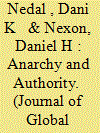

|
|
|
|
|
| Summary/Abstract |
Do international systems tend to remain anarchic because of recurring balances of power, or do they tend toward imbalances and hierarchy? Leading structural theories posit competing predictions about systemic outcomes, and the historical record offers evidence to support both claims. This suggests the need to theorize conditions under which one tendency or another is likely to dominate and what factors lead systems to transition from one state to another. We draw on constructivist and English School insights about international authority and legitimacy to develop such a framework. We conceive of patterns of international authority as structures independent from, and interacting with, mechanisms usually associated with international anarchy, such as the balance of power. We propose that international authority systems vary along two dimensions: particularist cosmopolitan and substitutable nonsubstitutable. Both are emergent properties of ideas and institutions located at the unit level. We argue that certain authority systems—particularist and nonsubstitutable—reinforce, and are reinforced by, anarchy and balanced distributions of capabilities. Others—cosmopolitan substitutable—facilitate rollup and domination and are likely to emerge or be maintained in hierarchic and highly asymmetric systems. By offering a structural account of international authority, we hope to contribute to the global turn in international relations, offering a framework for comparing systems across time and space. We also aim to help make sense of contemporary struggles over norms and values, their structural causes and consequences, and their potential implications for the future of global power politics.
|
|
|
|
|
|
|
|
|
|
|
|
|
|
|
|
| 2 |
ID:
165323
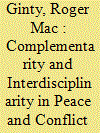

|
|
|
|
|
| Summary/Abstract |
This essay unpacks some of the nuances and complexities of peace and conflict studies. While it accepts that there are divisions between those who study conflict and those who study peace, it argues that there are also multiple sites of overlap and complementarity. Many of those who study topics labeled as “peace” are actually studying conflict, meaning that we have a complex “masala” of peaceandconflictstudies. Moreover, trends within social science research more broadly reflect the increasingly interdisciplinary nature of recent work.
|
|
|
|
|
|
|
|
|
|
|
|
|
|
|
|
| 3 |
ID:
165321
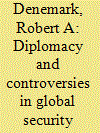

|
|
|
|
|
| Summary/Abstract |
In this work we identify elements of diplomacy as mechanisms with which to sharpen our understanding of security studies and weigh some claims regarding conflict. Diplomatic considerations have long been out of fashion in the field of global politics, and we seek to re- introduce them. In so doing, we situate ourselves within the general context of Goddard and Nexon's reformulation of security studies. We then identify two controversial questions in the security studies literature and consider them with reference to diplomatic interactions. The first of these is the argument raised by Jack Levy and William R. Thompson suggesting that great sea powers generate different balance of power dynamics than great land powers. We find support for the majority of their suggestions. The second controversy, closely associated with the work of T.V. Paul, concerns ‘soft balancing’ and arose to help explain the lack of balancing behaviors relative to the unipolar position of the United States after 1989. Soft balancing is controversial in part because identifying it requires us to understand the specific intent of various foreign policy actions. We use diplomatic activities to address the problem of intent, and find support for soft balancing in the diplomatic record.
|
|
|
|
|
|
|
|
|
|
|
|
|
|
|
|
| 4 |
ID:
165327
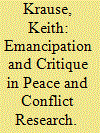

|
|
|
|
|
| Summary/Abstract |
This contribution examines how the critical potential of research on peace in International Relations has been simultaneously marginalized and transformed. It briefly traces the evolution of peace research, as well as choices, contestation, and breaks in the construction (and “disciplining”) of peace and conflict research. It then focuses on two epistemological and normative choices that occlude the emancipatory potential of peace research and marginalize certain approaches to the study of the causes of war and conditions of peace. In a more positive vein, it illustrates, with examples from recent research, where potentially emancipatory or transformative scholarship on building peace has migrated.
|
|
|
|
|
|
|
|
|
|
|
|
|
|
|
|
| 5 |
ID:
165319
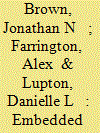

|
|
|
|
|
| Summary/Abstract |
When and why do friendly states deliberately share and unwittingly accept fabricated intelligence about others? Recent work on the interpersonal foundations of security cooperation suggests intelligence liaison is a type of embedded relationship that requires a dependable route for exchange (close personal ties) and a consistent record of exchange (reliably meeting expectations). We extend this argument to show that the relational embeddedness underpinning truthful intelligence liaison also explains the sharing of fabricated intelligence. We argue that intimate personal relations and a history of reliable exchange create a channel for effectively transmitting false information, for the recipient is unlikely to challenge its authenticity, and that violated cooperative expectations provide a reason for attempting to deceive a partner. Drawing on extensive archival research, we evaluate our theory by analyzing Britain's decision to share fabricated intelligence about Germany with the United States in 1941.
|
|
|
|
|
|
|
|
|
|
|
|
|
|
|
|
| 6 |
ID:
165325


|
|
|
|
|
| Summary/Abstract |
This article argues that unpacking gendered security dynamics helps overcome a binary view of peace and conflict, in scholarship and practice. Drawing on narratives from women and others in the case of Colombia, I show how a gender lens reveals long-term peace-building developments and experiences, and how women start processes that lead to peace, even in the midst of conflict. Therefore, if scholarship is to be conducive to the transformative goal of positive peace, it should shed light on the role of women in, and their perceptions of, security dynamics more widely and shift from focusing on male-dominated power centers to embracing experiences in the margins.
|
|
|
|
|
|
|
|
|
|
|
|
|
|
|
|
| 7 |
ID:
165320


|
|
|
|
|
| Summary/Abstract |
While event data provides researchers with insight into contemporary security threats, many are built upon secondary sources that may insert bias into empirical studies. Specifically, we argue that one form of bias—description bias—can be conditional on an event's characteristics or locale, thus influencing the certainty an observation is coded as an act of terrorism. We find that, using the Global Terrorism Database's own variables, attacks on civilians, particular types of tactics, and attacks that occur closer to a populated place are more likely to be coded as terrorism. These findings speak to broader conceptual issues in terrorism research and reiterate the need for researchers to evaluate the validity of their data before making claims.
|
|
|
|
|
|
|
|
|
|
|
|
|
|
|
|
| 8 |
ID:
165316
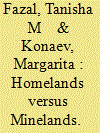

|
|
|
|
|
| Summary/Abstract |
Why do some armed groups commit to abide by the laws of war governing belligerent conduct during armed conflict, while others do not? We examine why only half the armed groups approached by the nongovernmental organization Geneva Call have signed a public Deed of Commitment banning the use of antipersonnel land mines. In contrast to recent studies that have tended to focus on the legitimacy concerns of armed groups, we argue that political objectives combine with military utility calculations to shape the behavior of armed groups in the realm of international humanitarian law. Utilizing original data on the ninety armed groups engaged by Geneva Call since 2000, we find that strong secessionist groups are most likely to sign the Deed of Commitment. Our findings have important implications for theories of international law, the study of civil wars, and on the ground efforts to mitigate the human costs of war.
|
|
|
|
|
|
|
|
|
|
|
|
|
|
|
|
| 9 |
ID:
165318


|
|
|
|
|
| Summary/Abstract |
When leaders negotiate face-to-face, why would an expression of anger make an interlocutor yield to one’s demand in some instances but cause him to become more intransigent in others? In this article, I consult recent findings in social and experimental psychology and provide an explanation for when anger is more likely to be considered a credible expression of resolve. Anger elicits concessions if a leader has projected an image for being composed most of the time. On the contrary, expressing anger makes an interlocutor more unyielding if a leader is known for becoming angry easily and frequently. I demonstrate such contrasting preconceptions of a leader’s temperament—a “stoic” versus a “hothead”—and their impact on the larger trajectory of international politics with two in-depth case studies on the face-to-face interactions between Khrushchev, Macmillan, and Eisenhower from the onset of the Berlin Crisis in November 1958 to the aborted four-power summit in Paris two years later.
|
|
|
|
|
|
|
|
|
|
|
|
|
|
|
|
| 10 |
ID:
165322
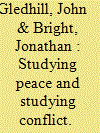

|
|
|
|
|
| Summary/Abstract |
“Peace” and (violent) “conflict” are often seen as conceptual mirror images of one another; peace is the absence of conflict, and conflict is the absence of peace. Given this conceptual interdependence, some scholars see that the study of war-making and the study of peacemaking are complementary—or even functionally identical—academic projects. Others, however, see that studies of violence and war-making are antithetic to studies of peace and peacemaking. The six contributions to this Journal of Global Security Studies forum explore these contrasting perspectives, with a view to assessing the “state of the discipline” of peace and conflict studies (and cognate disciplines, such as security studies). The introduction offers provocations for debate. The two contributions that follow consider connections and disconnections between the study of conflict and studies of postconflict peacebuilding and transitional justice, respectively. The next two contributions focus on areas of investigation that do not fit neatly into either the “peace” or “conflict” categories—gender and nonviolence—and the authors explore how studies of these topics might create bridges between scholarship on peace and studies of violent conflict. The concluding contribution argues that “mainstream” peace and conflict research has come to be dominated by positivist treatments of war and violence, and it draws attention to alternate approaches that have the potential to transform and ameliorate social relations.
|
|
|
|
|
|
|
|
|
|
|
|
|
|
|
|
| 11 |
ID:
165324
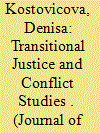

|
|
|
|
|
| Summary/Abstract |
This article identifies three aspects of conflict studies that are largely ignored in the transitional justice literature: debates over the causes of armed conflict, the transnational nature of contemporary violence, and the persistence of wartime actors and structures. It analyzes scholarly attempts that begin to bridge the divide between transitional justice and conflict studies. Those efforts demonstrate how engagement with conflict studies can open new research horizons in the study of transitional justice and lead to better understandings of how justice-focused interventions can bring about positive peace. However, innovation in primary data generation and methods is needed for this subfield to develop into a fully-fledged research program.
|
|
|
|
|
|
|
|
|
|
|
|
|
|
|
|
| 12 |
ID:
165326


|
|
|
|
|
| Summary/Abstract |
This essay argues that the study of civil conflict has predominantly focused on the collective actions of violent, armed nonstate actors. By overlooking the role of nonviolent actions during war, war-like environments, or contexts of prolonged political crises, research has also overlooked one of the ways in which civilians can influence trajectories of violence. Accordingly, this essay argues that, if researchers on both sides of the peace-conflict divide integrate dynamics of nonviolent resistance into their research, then the study of civilian-led nonviolent efforts could be one key way to build a bridge between the study of conflict and the study of peace.
|
|
|
|
|
|
|
|
|
|
|
|
|
|
|
|
|
|
|
|
|